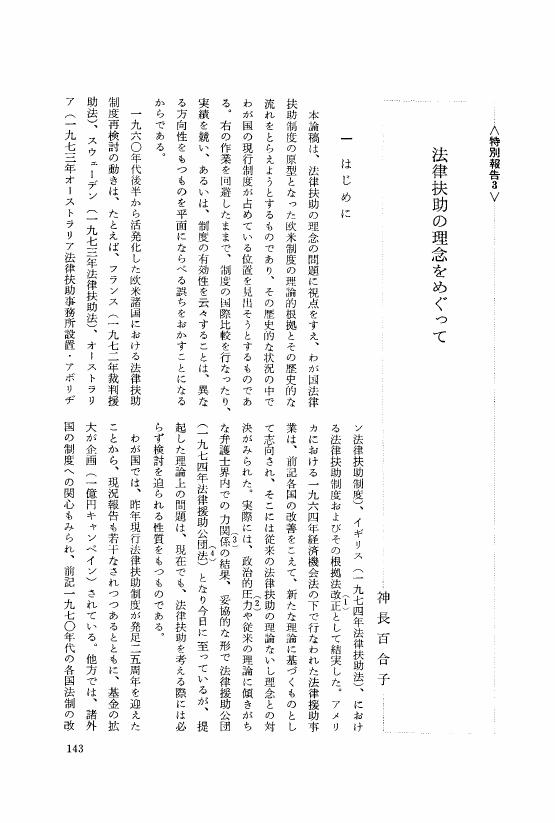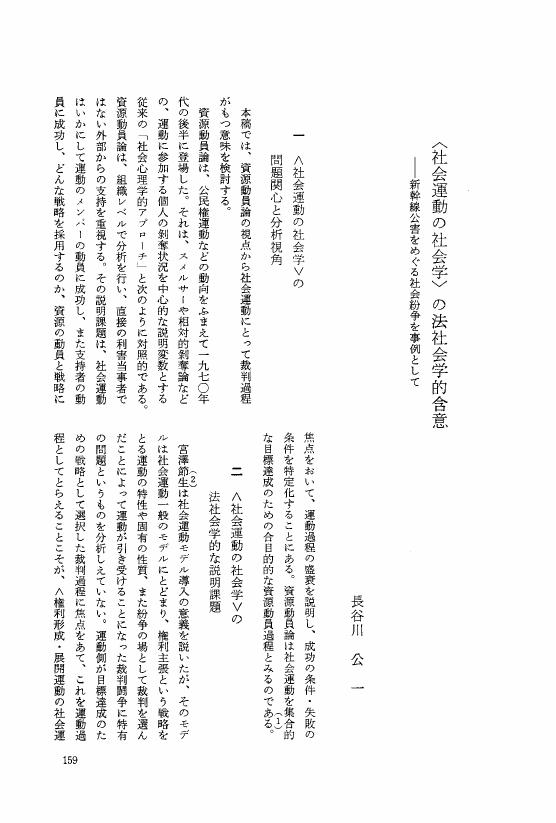1 0 0 0 OA 法律扶助の理念をめぐって
- 著者
- 神長 百合子
- 出版者
- 日本法社会学会/有斐閣
- 雑誌
- 法社会学 (ISSN:04376161)
- 巻号頁・発行日
- vol.1978, no.30, pp.143-152, 1978-03-30 (Released:2009-01-15)
- 参考文献数
- 33
1 0 0 0 OA ジェンダー的日常存在の純化とその解体
- 著者
- 坂本 正光
- 出版者
- 日本法社会学会/有斐閣
- 雑誌
- 法社会学 (ISSN:04376161)
- 巻号頁・発行日
- vol.2001, no.54, pp.59-79,259, 2001-03-30 (Released:2009-01-15)
- 参考文献数
- 12
In sum, the author of this paper wants to assert that the notion of gender that commonly works as a denominator to sever constructed character of sex and sexuality out of biological sex and sexuality might cease to function due to diversified interests of feminism activists. The paper examined briefly a history of feminism in Japan as compared with that in the United States for the last three decades. It came out with the observation that mighty emergence of minorities' voices other than essentialists' might bring out a breakdown of concept of gender as an adhesive of various interests. In conclusion, the author of this paper asserts the notion of gender should be more itemized and individualized to reflect the real world through its reconstruction.
1 0 0 0 OA リアリズム法学覚書
- 著者
- 鵜飼 信成
- 出版者
- 日本法社会学会/有斐閣
- 雑誌
- 法社会学 (ISSN:04376161)
- 巻号頁・発行日
- vol.1952, no.2, pp.98-105, 1952-04-15 (Released:2009-04-03)
- 参考文献数
- 6
1 0 0 0 OA <社会運動の社会学> の法社会学的含意
- 著者
- 長谷川 公一
- 出版者
- 日本法社会学会/有斐閣
- 雑誌
- 法社会学 (ISSN:04376161)
- 巻号頁・発行日
- vol.1989, no.41, pp.159-163, 1989-04-20 (Released:2009-01-15)
- 参考文献数
- 4
1 0 0 0 OA 社会規範としての「誠意」について
- 著者
- 吉田 勇
- 出版者
- 日本法社会学会/有斐閣
- 雑誌
- 法社会学 (ISSN:04376161)
- 巻号頁・発行日
- vol.1996, no.48, pp.199-203,244, 1996-03-30 (Released:2009-01-15)
In Japan, the frequent use of word "Sei-i" is observed in the process of negotiations and dispute resolutions. The essential core of "Sei-i" originated in the Japanese confucianism of the Tokugawa period. Since then, it has been gradually transformed into a complex of traditional, modern and contemporary types of "Sei-i". Therefore, Japanese "Sei-i" has various meanings today.Careful observation indicates that sometimes a sence of "Sei-i" gives normative influence on human relations, though it often plays only an emotional role. In that case, the word "Sei-i" is used to express a normative sense which people have in mind, especially when the injured party negotiates with the injurer for apology and compensation. And it is worth notice that both persons think highly of "Sei-i", but they often understand the same contents of it quite differently.A few scholars have already studied some aspects of "Sei-i", but they don't focus their concerns upon its normative sense. This paper deals with its normative sense in the process of negotiations and disputes between the injured party and the injurer.The main purpose of this paper is to construct theoretical model of normative contents and social functions of "Sei-i". Normative contents of "Sei-i" are classified into procedural contents and substantive ones, and both contents are constructed as a set of normative rules.This paper is the first step to the heuristic study of "Sei-i" as a sense of social norm.


